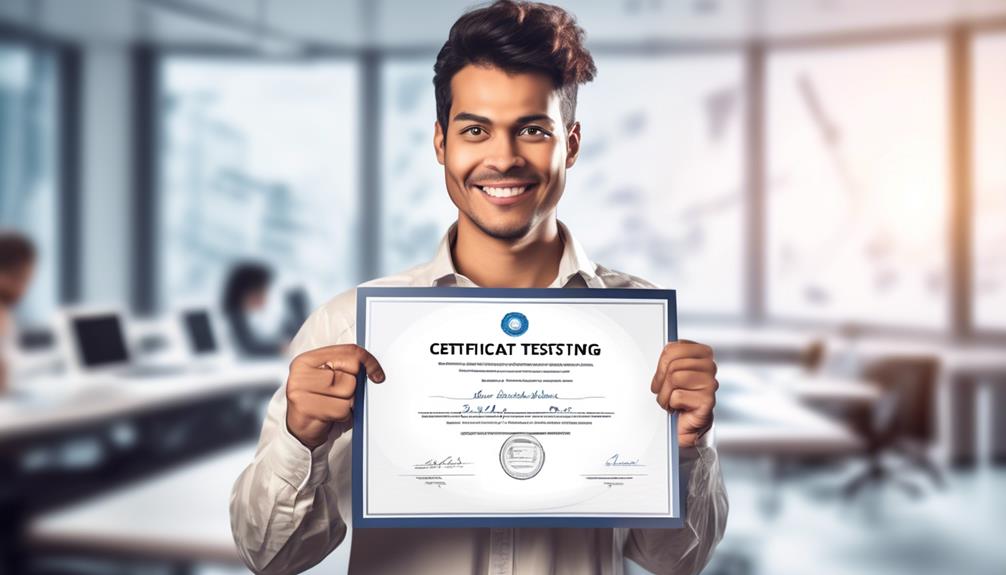The Bureau of Labor Statistics predicts a 9% increase in demand for software quality assurance testers over the next decade, as indicated by the data.
But how does one actually step into this role and excel in it? While it may seem like a straightforward path, the intricacies of becoming a software quality assurance tester are multifaceted and require a blend of education, practical experience, and specific skill sets.
Join us as we unravel the key steps and insights into navigating this career path and thriving in the dynamic world of software testing.
Key Takeaways
- A bachelor's degree in computer science provides fundamental knowledge for a software quality assurance tester.
- Gaining practical experience through internships, open-source projects, and beta testing programs is valuable in becoming a QA tester.
- Pursuing certifications such as ISTQB or CSTE demonstrates expertise and proficiency in software testing.
- Developing strong analytical, problem-solving, and communication skills, as well as staying updated with industry trends, are crucial for success in the role of a QA tester.
Understanding the Role of a QA Tester
How does a QA tester work with software or websites to ensure proper functionality through manual and automated tests?
A QA tester plays a crucial role in the software development process by meticulously testing the functionality, performance, and user experience of software and websites. Through manual testing, they meticulously verify each feature and component to identify bugs and ensure that the software meets quality standards.
Additionally, they employ automated testing tools to efficiently conduct repetitive tests and validate the software's functionality across different scenarios. This meticulous approach to testing helps in identifying and addressing issues before the product release, thereby safeguarding the brand reputation and ensuring compliance with industry regulations and standards.
Furthermore, the role of a QA tester is pivotal in enhancing product safety, efficiency, and overall quality. By engaging in various types of testing such as unit testing, integration testing, system testing, performance testing, regression testing, and user acceptance testing, QA testers contribute significantly to the overall quality assurance of software products.
The job demands analytical thinking, problem-solving skills, and familiarity with different software testing models, making it a career path that requires a high degree of skill and expertise.
Essential Education and Training

Playing a pivotal role in software development, a QA tester requires essential education and training to excel in the field. To become a proficient quality assurance tester, individuals should consider the following steps:
- Educational Foundation: Attaining a bachelor's degree in computer science, software engineering, or a related field provides the fundamental knowledge needed to understand the intricacies of the software development lifecycle, equipping individuals with a strong technical background.
- Practical Experience: Gaining hands-on skills through internships or entry-level positions in software testing is invaluable. Practical experience allows individuals to apply theoretical knowledge to real-world scenarios, enhancing their understanding of the field.
- Certifications and Continuous Learning: Pursuing certifications such as ISTQB or CSTE demonstrates expertise and commitment to quality assurance. Additionally, continuous learning through workshops, seminars, and online courses is essential for staying updated with industry trends and refining skills.
Obtaining the necessary education, practical experience, and certifications, while continuously seeking professional development opportunities, is crucial for individuals aspiring to thrive in tech jobs as software testers.
Gaining Relevant Experience
To gain relevant experience in software testing, individuals can pursue internships, contribute to open-source projects, participate in beta testing programs, volunteer for quality assurance initiatives, and assist in creating and executing test plans and cases for software projects. Gaining hands-on experience is crucial in the tech industry, and there are various avenues to achieve this. For instance, joining open-source projects or beta testing programs allows individuals to work on real-world testing scenarios and build a portfolio of their work. Additionally, volunteering for quality assurance initiatives within their current organization or as part of a project team can provide valuable exposure to different aspects of software quality assurance. Assisting in creating and executing test plans and cases for software projects is another effective way to gain practical experience in testing and understanding the nuances of QA testing. Moreover, individuals can consider pursuing a coding bootcamp or getting certified to enhance their technical skills and increase their chances of securing relevant experience during the job search process.
| Pros | Cons |
|---|---|
| Practical, hands-on learning experience | May require time commitment |
| Exposure to real-world testing scenarios | Competitive internships |
| Opportunity to build a portfolio | Limited compensation in internships |
| Enhanced technical skills development | Limited availability of volunteer projects |
| Networking opportunities | Potential for repetitive tasks |
Acquiring Relevant Certifications

When considering the acquisition of relevant certifications for software quality assurance testing, it's essential to research and identify industry-recognized certifications such as ISTQB or CSTE. These certifications hold significant weight in the industry and are often sought after by employers when hiring Quality Assurance Analysts and Software testers.
To effectively pursue these certifications, one should consider the following:
- Enroll in Training Programs or Online Courses: Seek out specialized training programs or online courses that are tailored to prepare individuals for the certification exams. These courses often cover the necessary technical skills and knowledge required to excel in the field.
- Gain Practical Experience: Practical application of learned concepts in real-world scenarios is crucial for reinforcing understanding and skill development. It's essential to gain hands-on experience in testing various software applications to demonstrate proficiency.
- Utilize Study Materials and Practice Exams: Use study materials and practice exams to assess knowledge and readiness for certification testing. This allows individuals to gauge their preparedness and identify areas that may require further focus.
Key Skills for Success
Developing strong analytical and problem-solving skills is essential for identifying and addressing software defects effectively in the field of software quality assurance testing.
As software testers, we need to learn how to analyze complex systems, break down intricate problems, and devise effective solutions.
Furthermore, enhancing our communication abilities is crucial for clear reporting of testing results and collaborating with development teams.
As QA testers, we must be able to articulate our findings clearly and work closely with developers to ensure that issues are understood and resolved efficiently.
Acquiring proficiency in various software testing models and methodologies is also essential for adapting to diverse project requirements.
This involves continuous learning and development to stay current with the latest industry trends, technologies, and best practices.
Cultivating attention to detail and organizational skills is equally important to ensure thorough testing and efficient defect tracking.
As software QA testers, we need to be meticulous in designing and executing test scenarios, and in documenting and managing defects.
Frequently Asked Questions
How Do I Become a Software Quality Assurance Tester?
We become software quality assurance testers by obtaining a bachelor's degree in computer science or a related field.
We can also gain practical experience as developers or testers through internships or entry-level roles.
Developing proficiency in programming languages such as Java, C#, and SQL is crucial for success in this field.
Pursuing certifications like ISTQB Tester or CSTE can also enhance our qualifications.
Staying updated on industry trends and technologies is essential for staying competitive in the field.
This approach ensures a strong foundation, technical skills, and knowledge of best practices.
What Qualifications Do I Need to Be a QA Tester?
To be a QA tester, a strong foundation in computer science or related field is essential. We also need proficiency in programming languages, understanding of software development lifecycle, and familiarity with testing methodologies.
In addition, analytical thinking, attention to detail, and effective communication skills are crucial. A relevant degree and certifications such as ISTQB can enhance our qualifications.
Experience in software development or testing can also provide valuable insights.
How Long Does It Take to Become a QA Software Tester?
Becoming a QA Software Tester typically takes from a few months to a year, depending on individual background and learning pace.
It's crucial to have formal education in computer science or a related field and proficiency in programming languages like Java and C#.
Practical experience as a developer or tester, along with completing online courses or formal training, are valuable paths to becoming a QA Software Tester.
Continuous skill development and staying updated on industry trends are essential for success.
How Do I Start a Career in QA Testing?
We start a career in QA testing by obtaining a relevant degree and gaining practical experience through internships or junior positions.
Learning coding languages like Java, C#, HTML, and Python is essential.
Obtaining certifications, such as ISTQB Tester or CSTE, demonstrates our knowledge of best practices in QA testing.
Continuous learning and staying updated on industry trends are crucial for enhancing our knowledge and skills in QA testing.
Conclusion
In conclusion, becoming a software quality assurance tester requires a solid education in computer science, practical experience in testing, and potentially obtaining relevant certifications.
Are you ready to take the next step towards a rewarding career in QA testing? With the right skills and determination, you can excel in this field and contribute to the development of high-quality software products.









